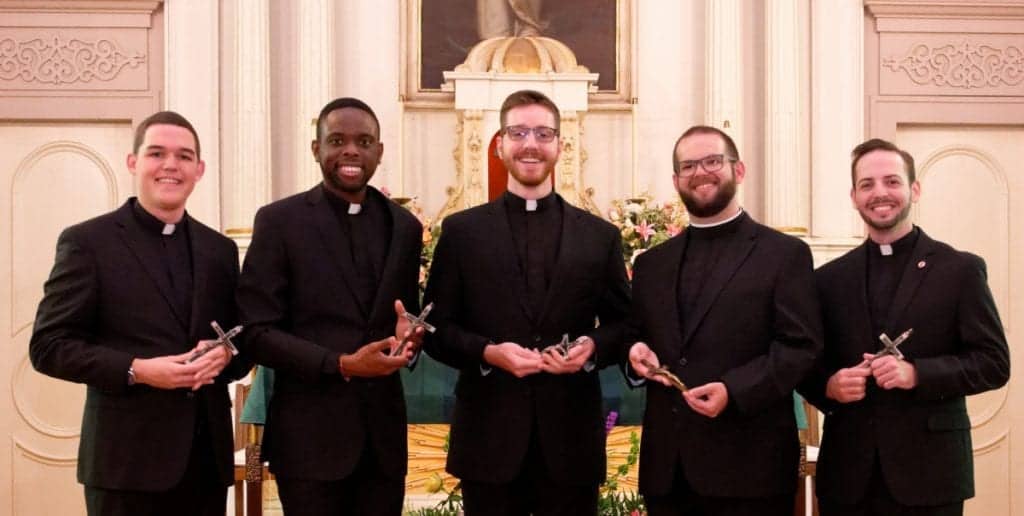As a Jesuit Brother, one of the questions I am most frequently asked by non-Jesuits is if I am a priest. When I answer that no, I am not a priest, the next most frequently asked question is when I am getting ordained. After I explain that I am neither a priest nor in the process of becoming one, a frequent follow-up question is, “Why don’t you want to be a priest?”
The confusion is understandable. Statistically speaking, most people have never met a Jesuit Brother. As of this year, there are 2,070 Jesuit priests and scholastics (Jesuits in formation to become priests) in the United States and Canada and 109 Brothers (and a good number of these are older and no longer in active ministry). Aside from the numbers, there are historical reasons the Society of Jesus emphasizes the priestly character of its mission.
As we conclude Jesuit Vocations Month, here is one Jesuit’s reflection on the Brother vocation and how it can help us all reflect on vocations in general.
Though we sometimes refer to the “Jesuit brothers” as a way of simply addressing Jesuits, and will sometimes even call a Jesuit scholastic , “Brother So-and-So”, to be a Jesuit Brother is a distinct vocation with a long history in the Society of Jesus.
When Ignatius of Loyola and his companions became formally recognized as a religious order by Pope Paul III in 1540, each of them was an ordained priest. Given how important hearing Confessions was in their early ministry, and how they already had a remarkable reputation as a group of “priests, learned and poor,” this small, close-knit band of the Society of Jesus was imagined as a society of priests.
Only a few years later in 1546, however, Ignatius once again approached Pope Paul III. The popularity of the Jesuits had grown so quickly, and so many ministries were being taken on, that help was needed. Paul III allowed the Society to admit both spiritual and temporal “coadjutors” (helpers). The coadjutors were to make the same vows of poverty, chastity, and obedience as other Jesuits, to be under the authority of Ignatius (and other Jesuit superiors), and to “share in all the good works which will be done in the Society.” The temporal coadjutors, who aided in the physical maintenance (artistically, financially, and administratively) of the various ministries, today are called Jesuit Brothers.
A Brother is a Jesuit, having made religious vows and under the Constitutions of the Society of Jesus. Their role, historically, is to help maintain Jesuit institutions, to provide support to the priests in the missions, and to collaborate with both Jesuits and non-Jesuits in the various works of the Society. While the role of helper can take many forms in many different situations, it remains, I believe, the guiding principle of this vocation.
I live the role of Brother most often within Jesuit community. I certainly feel the drive to go out and serve the Lord in the poor, the marginalized, students, and all people. In a particular way as a Brother, however, I feel the call to support my fellow Jesuits. Most often this is through small gestures: listening to, laughing with, working through a problem or project with the guys I see everyday. Ultimately, the Brother vocation, for me, means being ready to provide my presence and a cup of coffee (I am always up for a cup of coffee).
As the frequently asked questions I mentioned at the beginning attest to, the Brother vocation also provides a witness to the intentionality behind all vocations. Because so many think priesthood is the default role of a Jesuit, the choice of being a Brother stands out. This aspect of choice is part of all vocations, however.
It can be tempting to just let life direct us to our vocation (“If I meet the right person, then I guess I am called to be married”) or to wait for God to make our purpose abundantly clear (“If you want me to be a priest, just tell me!”). There can be a real desire for a “Damascus moment” – as when St. Paul, on the way to Damascus, was confronted directly by the Lord and given an unambiguous new direction in life.
Most of us, however, are not given such clarity in vocational discernment.
A vocation is a calling and it is also a choice. When a couple marries, they are drawn together in love and they must also actively choose to maintain and nurture that love. It does not “just happen”. When someone takes vows of poverty, chastity, and obedience as a consecrated religious they recognize that their calling is a gift from God and that they must actively choose to maintain and nurture that gift. When a man takes vows as a Jesuit, he must recognize a call from God to the priesthood or to the brotherhood and he must actively choose to live out one of those vocations.
For me, being a Brother means being a helper. Perhaps the Brother vocation can help remind us that we are all coadjutors with the Lord, choosing to cooperate and collaborate with God’s will in our lives.
The question is not why I do not want to be a priest but why I want to be a Brother. The answer? Because the Lord invites me to this life and I choose to work with Him in it. All the cups of coffee are a bonus.


